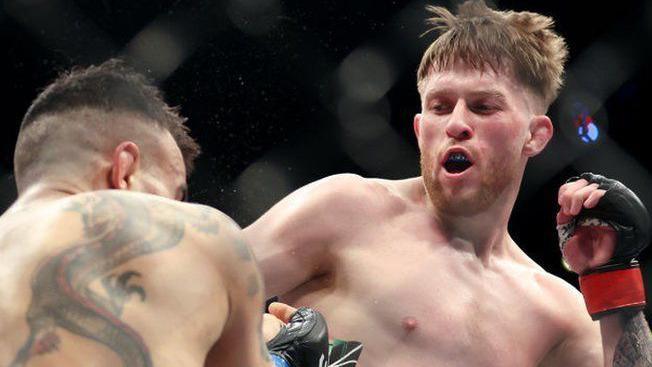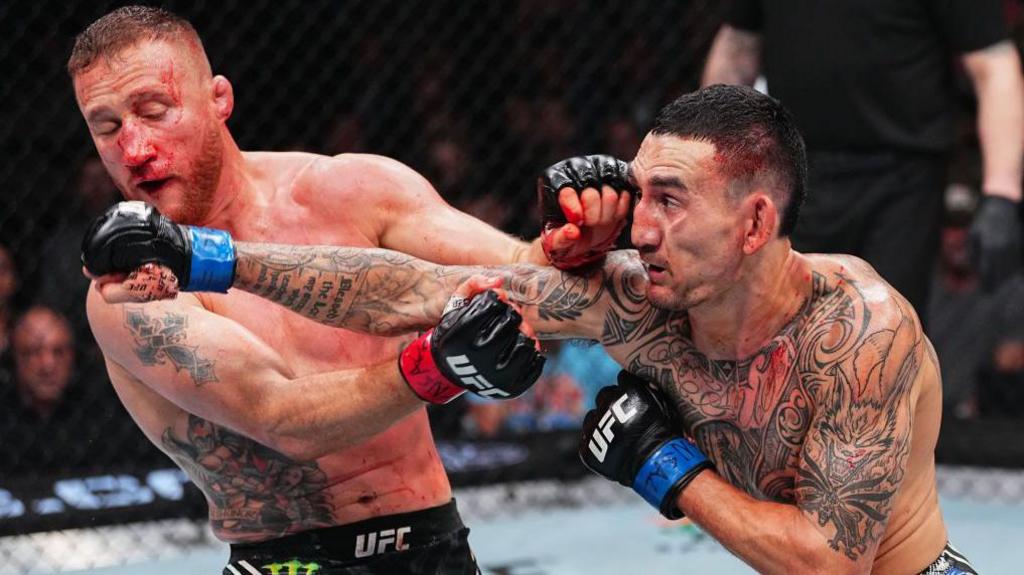Fighting is 'best and worst feeling at same time'

Jack Shore makes his return in Rio after 14 months out
- Published
Jack Shore knows that life is sometimes about contrasts.
Normally, home is the gym on an industrial estate a few miles outside the small town of Abertillery in south-east Wales.
Yet the MMA featherweight considers his answers from his hotel room just a few yards from one of Rio de Janeiro’s beaches.
This self-confessed introvert knows he is fast approaching a moment he struggles to explain as he prepares for his UFC return, 14 months since his last fight.
“That feeling of walking in there and hearing the gate lock, you can’t explain it until you’ve done it yourself,” Shore says of the MMA experience.
“It’s the best and the worst feeling in the world all at the same time.”
Shore is speaking before his bout with Brazilian fighter Joanderson Brito, scheduled for Saturday at UFC 301 in Rio, his comeback fight following hand surgery.
The 29-year-old is also reflecting on comments made by British heavyweight Simon Austin that, despite his career path, the Oktagon fighter hates fighting.
Shore has MMA in the blood, or certainly in the family, with UFC welterweight prospect Oban Elliott and current PFL featherweight Brett Johns among those who train at his father and coach Richard’s gym in the Gwent valleys.
But he admits people might find it hard to square the circle with what he does as a career and how he shies away from the spotlight out of the cage.
“I think [former UFC headliner] Nick Diaz uses the quote that he hates it so much he’s actually learned to love it, and I suppose I can relate to that,” he says.
“I’m not a natural fighter in that I’m not a naturally aggressive guy who came up fighting on the streets.
“I’ve probably disliked confrontation that much that I’ve had to teach myself to love it.
“I love the training, the lifestyle, the samurai and warrior code of it all, but I can’t sit here and say I look forward to a fistfight in front of 20,000.
“But when it comes to it, I can flip a switch and I’m not the same person as sat here now.”
Shore says there will be nerves and anxiety when that gate clicks, and that loved and hated feeling comes over him.
“It’s fight or flight and there’s a locked door so I know it’s time to dig my feet in and fight,” he says.
“You see so many people crumble in that moment – but that’s not in me. I might lose because the better man won, but not because of fear."
Jack Shore says a year out has helped him grow a larger featherweight frame
Shore prefers home with his family, admitting he is “a bit of a recluse” with his partner, son and dogs his escape from the contrasting world of conflict.
“It disappoints people when they don’t hear about having crazy hobbies, but I’ll get home Monday and no-one will see me for a week,” he says.
“I’ll be in the house stuffing my face and spending time with the family. I’m quite boring considering what I do for a living and how epic it is.”
However, Shore has missed that "epic" sensation after an operation that saw bone from his pelvis fused with his wrist after making his featherweight return at UFC 286 with a submission win over Makwan Amirkhani.
It would then be another six months before he could punch and grapple, but the wait, he says, was worth it.
Shore – with six wins and a defeat since arriving at the promotion – believes there are weaknesses he can exploit in Brito, nicknamed Tubarao, the Shark.
“It doesn’t get much better than fighting a Brazilian in Brazil,” he says.
“He’ll come out like a lunatic, but when he starts getting tired and I start to land my shots and get my game going, then 20,000 fans is suddenly going to start to be pressure.”
In contrast, Shore is relaxed at the prospect as he contemplates a short beach trip before flying home.
But none of that before once again embracing his best and worst feeling in the world.
You can listen to the full interview on Radio Wales Sport from 1900 BST or later on demand.
Related topics
- Published14 December 2024
